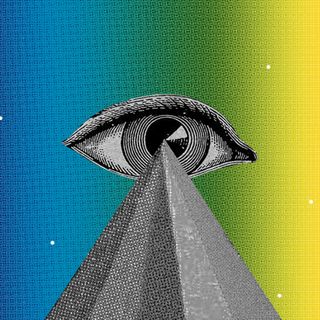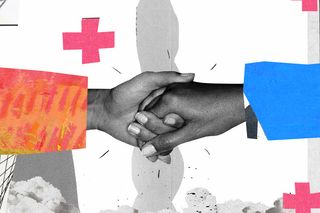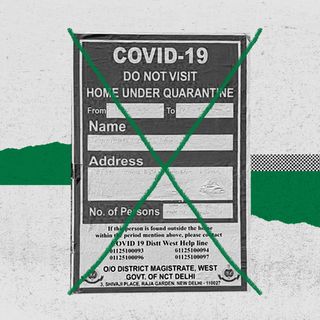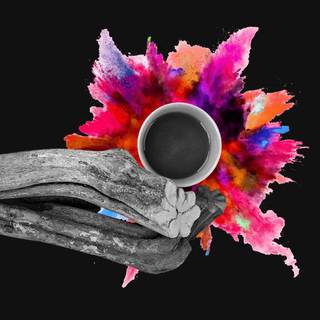
For Women With Chronic Illness, Health Mentorship Is an Essential Part of Health Care
“I just felt so much relief that there was somebody else in the same boat.”

“You want to scream,” says Lakshmi Sharath, 46, of the anger and loneliness she has felt during her nearly two-decade battle with endometriosis. “Dependency – especially if you’ve always been independent – it annoys you. The fear [of the unknown pain] was what was worse for me. I started panicking about everything. Helplessness, fear and anxiety for everything. Anger. This feeling that – you’re never going to be well again, you’re never going to be yourself again.”
“The sad fact is nobody understands this,” she adds, “because no one understands what you’re going through. Your parents don’t understand. Even I don’t know what’s happening in [my] body. Friends start disowning you; they don’t want to listen to your pain saga.”
“Endo sister” is the term of solidarity used within the internet community of women with this poorly understood condition. While perhaps not as inclusive as it could be (it’s possible for trans men to have endometriosis, too), the term speaks to the bond of a shared, painful experience, but also to something more – to an open and supportive relationship in which guidance based on lived experience flows freely.
Peer-to-peer health mentorship is not new – the formal practice originated in mental health care and has been around for nearly two-and-a-half centuries. Informally, these relationships have always existed, often within the network of extended family. And “over the last 20 years, the practice of peer support has virtually exploded around the globe,” write Larry Davidson, PhD, a professor of psychiatry at Yale University, and colleagues in a 2012 paper. While the paper focuses on peer support between people with severe mental illnesses, the point stands as other fields have increasingly adopted the practice; peer-to-peer health mentorship is now an established, sometimes even formalized, practice.
But what is new is the discussion about why patients – women in particular – need these relationships: A long, institutionalized history of medical sexism that leaves women, especially those with chronic illnesses, without the knowledge, care and relationships that could make their lives better.
*
“Most of these informal [peer-to-peer] groups start because they’re looking for information,” says Dr. D.S. Ratna Devi, founder of the Indian Alliance of Patients Groups. Or, patients are looking for emotional support. “Some of these conditions are so difficult to manage and last life long.”
Once diagnosed, Sharath coped by mentoring herself, reading whatever little research was available, trial-and-erroring methods to help her manage her day-to-day life. This was in 2012, when endometriosis was even less understood than it is now. While the U.S., a leader in medical research then and now, had been requiring medical trials to include women for 20 years, there was no mandate to study conditions unique to them.
That same year, Dr. Rama Vaidya, director of Endocrine and Metabolic Disorders at the Medical Research Centre-Kasturba Health Society in Mumbai, remembers asking in an address to the Indian Council for Medical Research why PCOS wasn’t part of India’s public health agenda. PCOS is a chronic reproductive condition that affects as many as one in five Indian women; unmanaged it can lead to diabetes, obesity, infertility, non-alcoholic fatty liver disease, depression, and more. “Noncommunicable diseases [are] included in the government’s and health policymakers’ [priorities],” she remembers pointing out in her speech. “But where is PCOS? Is it neglect? Is it a gender-based neglect?”
Further, there are aspects of living with the disease that even changes at a policy level cannot address. “The dimensions of PCOS are multiple. Every dimension cannot be dealt only with medical people and only with health care systems. There’s a need for [peer-to-peer health mentorship],” says Dr. Vaidya, a founding member of Abhiyan PCOS, a multidisciplinary research, treatment, and advocacy collaboration.
Aside from the day-to-day vagaries of chronic conditions, a health mentor can help with social fallout, too. As Sharath experienced in her struggle with endometriosis, for PCOS patients, relationships falter under the strain of the condition. “Relationships get affected if you don’t have periods for nine months,” Dr. Vaidya says. Irregular menstruation is a common effect of PCOS, but other PCOS symptoms also strain relationships. “Hair growth on the face … can cause cosmetic discomfort … which makes [women] shy away from socialization with even their closest ones. … They’re not with you – they’re looking at you.”
“No one understands better than [people with the same condition],” Dr. Vaidya says. “There’s a need for a PCOS support group. There are so many issues with the psyche, that [the patient only] feels comfortable with someone that has overcome some of the trauma and has understood.”
The average time that elapses from the onset of polycystic ovarian syndrome (PCOS) symptoms to diagnosis is more than two years. For fibromyalgia and chronic fatigue syndrome, the average wait is five years. For lupus, the average wait for a diagnosis is six years. For endometriosis sufferers, it’s seven and a half years. These and most other chronic illnesses overwhelmingly affect women more than men; some, like PCOS and endometriosis, only affect people who are biologically female. This means women are more likely than men to be sick or in pain for years with no answers, let alone treatment. And during this time, their symptoms are likely to be dismissed, even derided.
This limbo takes a toll. A decade of feeling like “multiple knives always being poked in you,” with no explanation, changes a person, Sharath says.
“You’re losing everything – you’re losing your career, your family because they’re not connecting with you. You’re losing your social life because you’re losing friends,” Sharath says. “A whole decade just went. I was not what I’d been. I became somebody I couldn’t recognize. Even today I’m trying to grapple with that.”
Health mentorship can chip away at that delay in diagnosis and spare others the mental health fallout that can accompany living in limbo. That was the experience of Urmi Bhattacheryya, 30, who was diagnosed with fibromyalgia in 2019, after only a few months of symptoms. Bhattacheryya credits her boss at the time with becoming her health mentor.
“I didn’t know what was happening to me. It’s a lot of random [symptoms]; there was temperature sensitivities, there was pain keeping me up all night. … I began to experience brain fog. My periods were getting more painful. I was losing interest in sex.”
Anxious, and desperate for answers, Bhattacheryya approached her boss to ask for time off to consult doctors and get tests. Her boss, who also has fibromyalgia, suggested Bhattacheryya get checked for the condition.
“I couldn’t even describe to you what that felt like. That moment of clarity and relief. I just felt so much relief that there was somebody else in the same boat. She sat me down and we had this conversation where she told me she hadn’t gotten diagnosed for an entire year because doctors kept sending her from one clinic to another. She said, ‘If I can cut that process short for you, let me do that, because it sounds eerily similar.’”
She pointed Bhattacheryya to the right doctor, and two weeks later, Bhattacheryya was diagnosed with fibromyalgia, too.
*
Bhattacheryya is now part of a WhatsApp group for Indian women with fibro, where members share tips and tricks about what works. She describes it as a comforting sounding board. “That’s something I’ve really treasured.” But she doesn’t think it’s entirely unique to her experience with fibro. Women’s health is deprioritized against nearly everything else, not just at the public health level, but also within the home. The need for and appreciation of health mentorship is, in a way, universal to women.
“When I’m speaking to [other women] about something [related to fibromyalgia], they’ll always bring something up along the lines of, ‘I’m glad you talk about this because so-and-so wasn’t taken seriously when it happened.’ There’s always another example…”
“The assumption always is [I’m] not being able to talk to a lot of other people, not being taken seriously, or being disbelieved by others, which has to do with a larger [patriarchal] family structure where people aren’t taken seriously, especially women,” she says.
In 2017, Sharath, along with a colleague who also had endometriosis, formed a support group for endometriosis sufferers in India.
“Nobody talks about how to manage your life, how to manage your sex life,” she says. “Mental health issues are almost a byproduct of endo, and no one talks about it. And how personality can change because of chronic pain.”
The Facebook group now has “a life of its own,” Sharath says, with about200members. It’s a place where women bounce ideas for endometriosis management off each other, make suggestions, ask for guidance around treatment, medication, and doctor options, and share their stories.
“These are simple things, but it really helps in our group when we discuss this,” she says. “The bonding actually gives you a sense of faith and hope.” Most of all, Sharath says, the group is a place where people with endometriosis can find empathy and understanding.
At its best, peer-to-peer health support not only makes the day-to-day experience of a health condition more manageable and less isolating, but it also builds a quorum of patients who can then demand more research and better care. That’s especially important for women, Dr. Devi says.
Liesl Goecker is The Swaddle's managing editor.
Related


SC Rules Covid19 Quarantine Posters Outside Homes Violate Right to Privacy
